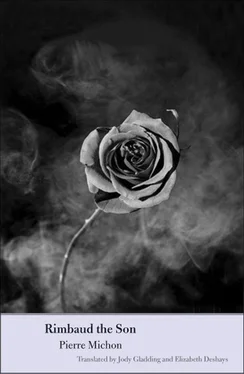For I think I have stated the only three ways a living being could react to the existence of this living being, who was or had otherwise been poetry in person — this living willful being, locked into his hatreds and all doors open wide to the infinite freedom of objectless loves, in whom the love and hate he had embraced had nevertheless found in the Word an object so perfect that the man, without ceasing to walk, to desire, and to curse, practically ceased to exist when the Word collapsed; I think I have said everything about the human courses of action that were permitted before him, if one wished to remain human: being incommensurably outdone with a single blow, pretending not to be and proclaiming aloud not to be, but looking away and giving up, as Izambard gave up; interminably answering him, commenting, that is to say negotiating, knowing all the while, however, that the deal is rigged, with each weighing the king who is in the poem throws his gold sword onto the scale, you have to start over, accumulate on your side years of wretched paperwork, and still the scale’s beam does not move a hair: that was Banville’s way, or rather the way of that multiple man whom I called Banville for the sake of convenience. And finally, to do him in, once and for all to oppose lead to the Word, as Verlaine attempted. And if there were other human postures, they have escaped me — although blind obedience has not escaped me, doglike admiration of a small being for a great being, which was good Sotiro’s way; but that does not interest me here, because obedience is not a quality of a man of letters , I mean that it has no dealings with the eternal relaunching of literature.
Nevertheless, I would like to leave Arthur Rimbaud there in the company of Sotiro among the banana trees. There could be worse fraternities: good Sotiro trots along with the tripod camera on his shoulder, his short legs make it hard for him to keep up with his boss’s mythological strides. Beside the palm gardens the boss disappears, there his perfect rhythms disappear, his repudiated rhythms, his delenda est and his taste for the word merde . And perhaps that is the word he cries once more from under the shadows where he has disappeared, but as if it were a joke, a caress, for the benefit of the good Sotiro. And there: behind Sotiro, in turn, the palms close, perhaps they rest under the banana trees, the boss sleeps, once more he tries in vain to sleep off the drunkenness of his adolescence, the servant watches him sleep. No one sees them. What calm. No bugle here, under this shade; but already in Paris the bugles are sounding, a new flag is hoisted with the name of Rimbaud on it, and no longer those of Hugo, Baudelaire, old-fashioned names — everything is ready for the work of the dark fairy: the loving prose of the appalling Verlaine, the abracadabras of the poets Darzens, Baju, Ghil, Montesquiou, Berrichon, Gourmont, part seers, part Limousin schoolboys, and soon Claudel shut away in Notre Dame, Breton fulminating his harebrained hierarchies, soon the benevolent tamperings of the poor appalling Isabelle. Already everyone in Paris recognizes himself in the little oval portrait as if it were a mirror: everything is ready for the hermeneutic tourniquet, the interpretation mill spinning around a work as small and closed as a fist, clenched like a fist over a meaning it guards, a work born of a life torn apart, cut off like a human fist. He is sleeping in banana fields. It seems that he is keeping quiet. Around that silence, the free-for-all has begun. And, since I have to add my two cents to that free-for-all, since I must have my opinion on the matter, I will add that I think that if he kept quiet, if he amputated himself alive from poetry as we have so obediently repeated since Mallarmé, it was because the word was not that universal pass that the young Rimbaud of Charleville had so ardently imagined — and he realized a little too late that gold alone had some chance of being that pass (I wish with all my heart, Arthur Rimbaud, that you really, physically, wore against your skin that magic belt of gold that some people attribute to you, and that in the desert it granted you all rights).
Finally, if I regretfully tear myself away from the romantic mirage of that golden belt, that attribute of Sardanapalus as though worn under a mamluk’s red waistcoat, I would also say that perhaps he stopped writing because he could not become the son of his works, that is to say, he could not accept their paternity. He did not deign to be the son of the Bateau ivre , of the Saison and Enfance anymore than he had accepted being the offspring of Izambard, Banville, or Verlaine.
I am looking at the comet. Belt of gold, milky way, beacons who art in heaven, images.
One last time I take up the Vulgate.
It is said that after Brussels, with Verlaine in Mons, well before the banana fields, Rimbaud returned to the fold; that in an attic in the Ardennes, in Roche, right in the middle of the fields and woods where the peasants of his maternal line had laid down their lives in vain harvests up to Vitalie Cuif, at harvest time, this appalling young man, this brute, this small heart of a girl, wrote Une saison en enfer; that at least if he started it elsewhere, in the land of Baal, in the metropolises where civilization had fallen into the clutches of Baal, the smoky, futurist clutches, he finished it here, in this highly civilized rural hole, in the clear and ancient light of the harvests. And when they entered the kitchen between two cartloads of sheaves, the brother, the two little sisters, the mother with her face of December in the middle of July, when for example at four o’clock in the afternoon they granted themselves a little shade, in the cool shade cut themselves bread into cool wine so as to take up their busy dance under the sun more bravely, those harvesters heard overhead the author of the Saison sobbing; and in those sobs for a century we have wanted to hear mourning, the loss of Verlaine, the collapse of literary ambitions, the lead received once and for all in the wing; also the mourning for seeing , for magic tricks to make the word appear, all the futurist mumbo jumbo that the Saison disavows in plain terms; but I wonder if those sobs, those cries, that fist beating the table in time were not, beyond all mourning, a very ancient and absolutely pure joy. If perhaps they were sobs of the grand style, that once in your life grace happens to let you spill onto the page: those that the right words tear from you when they pull you forward, those that shatter you when the right rhythm pushes you furiously from behind, and you, left dazzled in the middle, pronounce the truth, meaning, and you do not know how but you know that at that moment on the page is meaning, on the page is truth; you are the little man who speaks the truth; and you cannot get over the fact that in a sad hole in the Ardennes, at Terrier des loups, close to an old woman, dark and insane, meaning has made use of your brutish hand, your brutish mourning, your girl’s heart, to once again appear in its old castoffs of words. Its mantle of June. You burst into tears before that mantle. And the harvesters below, soaking their four o’clock bread in their wine cut with cold water, exchanging looks filled with consternation over poor sobbing Arthur, were entirely wrong: because what they were hearing was perhaps something like the echo here below of the triple sanctus that for eternity the kings of the Apocalypse tirelessly repeat tirelessly gazing at the glory of God; and nothing tells me that the kings of the Apocalypse do not sob eternally, uttering truly the triple sanctus . It was that great racket the harvesters heard. But however true the sanctus , of course Rimbaud was not contemplating the glory of God; because he was born and was writing at the appalling end of the nineteenth century; thus before him on the desk there was only the vain glory of the right words, from which God had been absent for a long time. Thus what the harvesters heard at other times, when for example at dawn they soaked their bread in the same bowl as at four o’clock, but it was filled with coffee and not wine, was the other voice, very old as well, ferrea vox , the voice of iron, vehement, authoritarian, despotic, the voice of the old prophets cast upon the wicked earth, full of resentment that their least word not be the triple sanctus , charging God to show himself, insulting him, crying only to the azure void of dawn. And when he was not the little king of the Apocalypse, the little Jeremiah in his attic made a great racket as well.
Читать дальше












